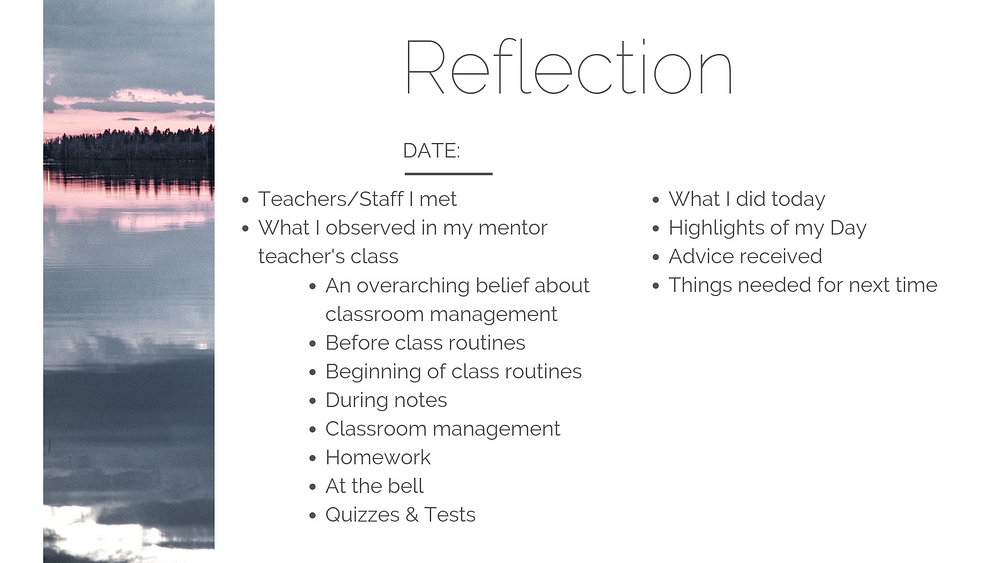You know that feeling when you secretly wish for something and hope that it comes true, but you also know that the chances are low so you don’t try to think about it as much? Now imagine the thrill of excitement and gratitude you feel when your wish comes true… that is how I felt when I found out that for my first student teaching experience, my mentor teacher primarily teaches Math. This was exciting because Math is my minor, and usually practicums are in the major subject; my major is Computing Science.
Since the Math curriculum course that I took in January, I have spent a lot of time reading, writing and developing ideas for teaching Math. I was registered for Geeks Unite 2, Alberta’s Math and Science Specialist Councils joint Conference where Jo Boaler was coming (more on that in an upcoming article). I am almost done with the How to learn Math for teachers course by Youcubed. I have been immersed in Math for almost a year and my excitement touched the ceiling when I found out I had the opportunity to apply what I had learned, being guided by a passionate Math educator and grow into a better Math educator.

Amidst all this excitement was nervousness — fears about presenting myself right at this crucial first impression time and worries about doing everything correctly — getting there on time, parking in the right spot, reporting at the office, getting to know the school layout, observing in class, getting to know the students, building a relationship with my mentor teacher,… the list of things I was considering was endless, some of them areas that would take more than a day to develop.
I read all the documents on my university website and they outlined clearly all I needed to do, the expectations my mentor teacher, school and university had of me, the amount of teaching I would be doing during the course of these 5 weeks, the growth plan I would work on,… here was another set of things to consider.
Overwhelming, right?
You know the feeling when you know you aren’t going to get much sleep at night because you are so excited for tomorrow and nervous at the same time? That was my night before my first observation day.
And I am sharing this because if you are a student teacher, you will be/have been in this place too. If you are a mentor teacher, this is where your student teacher was at, and maybe you were too when you were a student teacher once. 🙂
Don’t worry though. This is a journey to grow and it will be amazing, no matter how nervous or unprepared you feel. Keep that excitement in your heart. Remember why you are there.
Here are some things I learned from my first day in my mentor teacher’s classroom. Most of these are truths I will face over and over, others are just strategies that I learned from the many instructors and mentors I have had over the course of my education. I hope they will help you on your first day too. Know that I am no expert at this and I am only sharing my experience here, fulfilling the need I had had when I was trying to find out what the first day might feel like.
Move. Listen to the voice that is telling you to do something now.
“But Richard (my Zone Field Experience Associate) said that we should help out whenever we can, something as simple as distributing the worksheets.” That was my inner voice telling me get off my stool and help my mentor teacher as she distributed the quiz papers and answer sheets in the first period.
I did get up and once I did, it was easier to get up the second time. And the third time.
See a student who needs help or has a question while your mentor teacher is doing something else? Go talk to them. In another period, a student asked me a question. Since this was during a quiz, I wasn’t sure if that was actually a question or he was trying to confirm his answer. Thankfully, my mentor teacher came to see what we were talking about and she told him to trust his gut. Now I will always know what to do when students ask questions that might give them answer to test questions. 🙂 If I had not gotten up, I would not have learned this neat trick.
Don’t compare with other student teachers. You are your own person.

This is a hard one. Your peers might tell you how they observed so many other teachers in the school. Everyone will know them faster than they will know you maybe. You might start thinking and comparing because (and this was me), “I spent all my day with my mentor teacher”. Something else that I learned after this peer exchange was that I will get there — my mentor teacher and I will decide who I should observe and maybe I will want to observe other teachers too but for the first day, she was my focus, and I will never regret not spending time with other teachers in the school and starting on those relationships. I will reach a point where I will slowly transition into knowing them.
But that might not be you — you might want to see every teacher and get to know the whole school. Maybe your mentor teacher will set up the first day where you are observing others. Maybe that is what you need on your first day. And that is ok too. So don’t compare with your peer. And if you do, don’t spend too much time dwelling on it. This is all part of the process of learning.
Take notes. Ponder. Ask.

I had a long list of things I wanted to observe in the classroom and I reviewed the list the night before. Once in class, I did not worry about hitting every point in the list. I knew from memory that it was about classroom routines and I took notes about the things that I noticed. I realized quickly I wasn’t going to be able to fill out the well organized document that was given to me. This was because I would end up wasting time trying to find the right spot for my one observation. Hence, I gave up and took notes in free form, leaving organization for later.
When you let your mind do the observing, not a checklist or form, things happen.
Here are a couple questions that I instantly found answers to once I let the checklist go:
- This was not part of the checklist. I had read a discussion about not calling students ‘guys’ as a class. Hence, I had wondered how my mentor teacher addresses the students. I didn’t have to ask her; I only had to observe and listen.
- What is the policy around homework?
- Where is the scrap paper located?
- What if someone wants to go to the washroom? Or their locker to get something?
Other questions will come up as situation arises. For example, I asked about headphones when I saw a student wearing them during a quiz. I figured out the no-cap policy when a student was told to take his off. I also enquired about re-dos for quizzes.
Take notes of everything that you think you would need. Other super important things, your mentor teacher will fill you in on, for example how many students are allowed out of the class at a time, and dress code for teachers.
As a student teacher, I will be teaching in place of my mentor teacher. I am not there to disrupt her routines or build new ones. I am there to learn in the environment that has been set up for me and take away lessons for when I will be able to set it up myself. In this time, I have a safe zone to try my ideas and have someone to guide me when I struggle.
Don’t be afraid to ask for feedback.
I asked my mentor teacher at the end of my day how I did. It was a great way to get to know the actions that I took which she noticed and liked, and the ones that I could improve on for next time. It might be the first day but it’s not the last day and you are going to be coming back to it. So, ask. It’s difficult to ask but it’s equally important. It builds relationships, informs you about how your mentor gives feedback and prepares you for later, more focused feedback.
Reflect. Write it all down at the end of the day.
I had taken a lot of notes over the course of the day and at night, before I went to bed, I decided to summarize all that I had learned. I started a document called ‘Reflections’ (now renamed to ‘Practicum Journal’ )and here are the board categories of information that I recorded in it:

The next time I go, my reflection prompts might look a bit different but I am hoping that in the next couple weeks, I can come up with a consistent system to record my observations and reflect upon my day. The Highlights of my Day section will probably not go away because it contains the sweet wonderful things that happened which I was not expecting.
If you don’t want to write it, record it. Some of my peers do that instead, building an audio log of their day.
It is important to reflect everyday in whichever form you find comfortable. It’s part of growing as a professional — being aware of where we are and where we want to go.
It was an amazing first day! My nervousness and excitement were justified and I am sure they will come back as I prepare to go to my next day, but eventually, this will become part of life. And then the 5 weeks will be up and I will feel sad. But that’s ok too.
We must make the best use of the time that we have.
This is just the first day of your 30–35 years long career in teaching. Breathe.
Carla Babichuk, my Pre-Practicum course facilitator

Be First to Comment